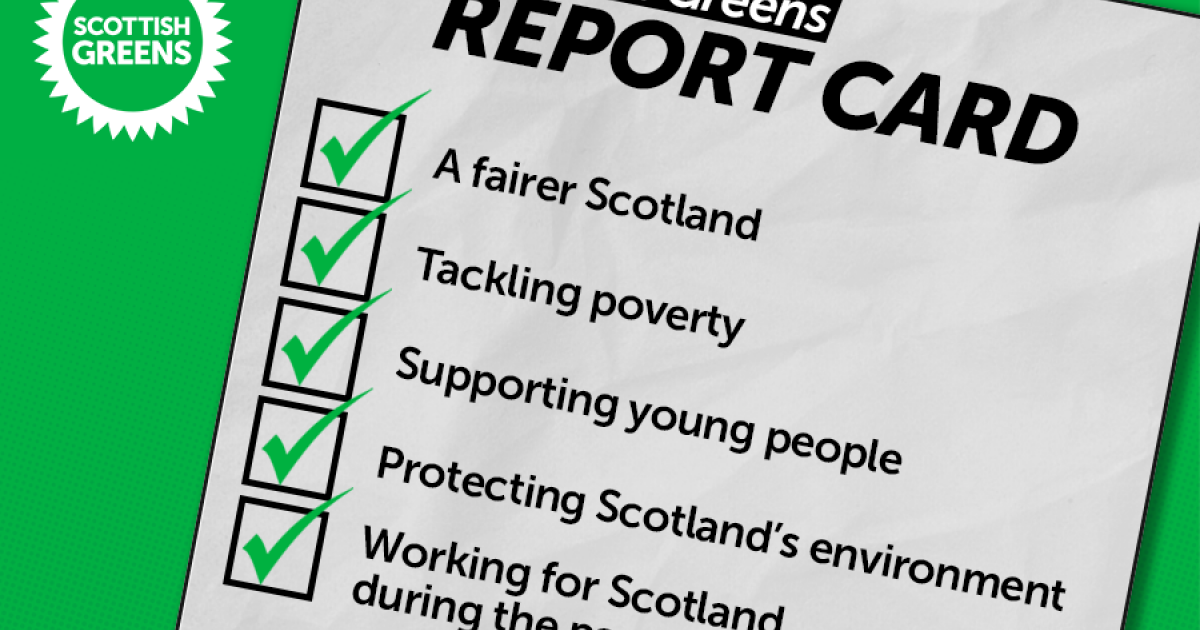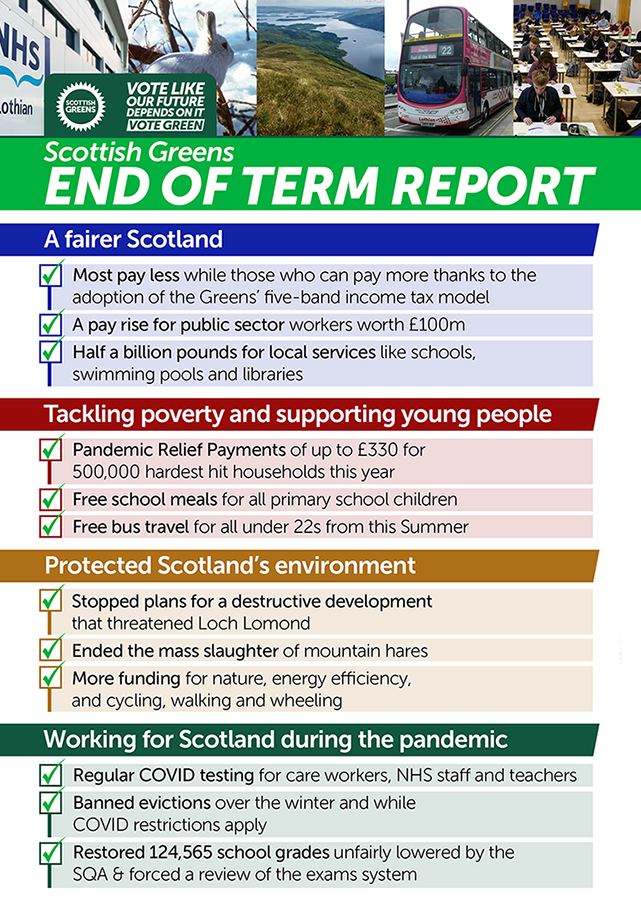2016-2021: End of Term Report

Over the last five years the Green MSPs have worked constructively, delivering a real impact across Scotland. Here are some of our highlights.
A fairer Scotland
Most pay less income tax while those who can pay more
The Scottish Green’s proposals for a five-band income tax model have been introduced, making income tax more progressive and raising hundreds of millions more for the public services we all rely on. For example:
-
A newly qualified nurse earning £17,460 per year will pay £20 less in Scotland than in England.
- A CEO on a salary of £73,000 will pay £1,174 more in Scotland than in England.
- A university principal on a salary of £342,000 per year will pay £3,694 more in Scotland than in England.
A pay rise for public sector workers worth £100m
The pandemic has put immense pressure on public sector workers, particularly in the NHS and teachers and other school staff. That’s why we prioritised a better pay deal in our negotiations over this year's Scottish budget.
We secured an additional £100m for a pay deal that will mean all public sector workers on £25k or under will get a pay increase of £800. For a Nurse on an average starting salary of £24,900 this is equivalent to a 3.2% raise. For a teaching assistant on £18k it’s 4.4%. Public sector workers on £25k-40k will see their salary increase by 2%, and above that it will be 1%, capped at £800.
Half a billion pounds for local services like schools, swimming pools and libraries
Local services are the bedrock of our society. Green budget deals over this parliamentary term have put an additional half a billion pounds into local services across Scotland. This money has allowed Councils to continue to make facilities available to the public including swimming pools and museums, as well as keeping many of these services free of additional charges.
Tackling poverty and supporting young people
Pandemic Relief Payments of up to £330 for 500,000 hardest hit households this year
To help tackle rising poverty, particularly amongst children and families, the Scottish Greens secured a commitment from the Scottish Government to deliver £100m of Pandemic Relief Payments to the poorest households in Scotland.
In early summer half a million low income households will get £130, targeted at those in receipt of Council Tax Relief. 170,000 families will also get two further payments of £100; the first in August in time for the new school year, and the second in December ahead of Christmas.
Free school meals for all primary school children
Tens of thousands of children across Scotland live in poverty but are not currently getting free school meals. For many more hard-pressed families the cost is a huge financial burden. Universal free school meals tackle poverty, improve health, and tackle health inequalities. The Scottish Greens negotiated with the Scottish Government to secure the phase in of free school meals for all Primary pupils between now and August 2021.
Currently, P1-P3 pupils already get free school meals. This will be extended to P4 children in August this year, P5 in January 2022, and P6 and P7 children in August 2022. This will mean over 200,000 more children benefiting from free school meals and is worth £112m a year.
We also ensured that all primary and secondary children from low income households will get free school meals through the holidays, starting in time for this summer.
Free bus travel for all under 22s from this Summer
Thanks to the Scottish Greens, bus travel will be free for everyone in Scotland aged 21 and under from this Summer. This will tackle poverty, improve household budgets, help build a culture of public transport, and reduce climate emissions from transport.
Protected Scotland’s environment
Stopped plans for a destructive development that threatened Loch Lomond
Scottish Green MSP Ross Greer led a campaign against Yorkshire-based Flamingo Land’s application for a large and destructive development on the shores of Loch Lomond.
Loch Lomond National Park is one of the jewels in Scotland’s crown, yet this proposal would have destroyed ancient woodland, polluted the water, and threatened wildlife like red squirrels. A record 60,000 objections were collected by the Scottish Greens and the community-led Save Loch Lomond campaign, and Flamingoland was forced to drop its proposals.
Ended the mass slaughter of mountain hares
Mountain hares are an iconic species native to the Scottish Highlands. The population is in major decline, their conservation status was recently downgraded to unfavourable. Yet they were still being slaughtered in huge numbers on grouse moors because the owners hoped this would result in more grouse for recreational shooting. On average, 26,000 were killed every year.
On the 1st March mountain hares became a protected species and the slaughter ended following years of campaigning by the Greens and a successful amendment by Alison Johnstone to the Wildlife and Animals Bill last year.
More funding for nature, energy efficiency, and cycling, walking and wheeling
The Scottish Greens have struck budget deals that have meant more funding for a green recovery have resulted in:
-
£35m more for infrastructure for cycling, walking and wheeling.
-
£60m for energy efficiency measures, helping make homes warmer and low carbon
- A new £10m Nature Restoration Fund. This fund will offer grants for projects that deliver rewilding, and nature-based solutions to the climate emergency.
Working for Scotland during the pandemic
Regular COVID testing for care workers, NHS staff and teachers
In April 2020 the Greens published a report that called for regular, weekly testing for frontline workers in response to growing evidence of asymptomatic transmission. We were the first party to do so, and thanks to pressure from the Greens this was finally introduced for care home staff in May last year, NHS workers in November, and is now being rolled out for teachers and other school staff.
Banned evictions over the winter
The Scottish Greens have consistently stood up for better protections for tenants throughout the pandemic. A campaign by the Scottish Greens persuaded the Scottish Government to introduce an eviction ban over the Christmas period during the pandemic. This was then extended to apply throughout the whole winter period following Green pressure.
Reversed the decision to mark students down because of what school they went to
When the pandemic hit and exams were cancelled, the Scottish Greens consistently warned that the Scottish Government’s approach to assessing pupils was unfair and unfit for purpose. These warnings were initially ignored and when the Scottish Qualifications Agency issued grades that had been lowered by their discriminatory moderation system that meant that students were marked down because of the school they went to there was uproar.
The Scottish Government were forced to agree with Green demands, leading to the restoration of 124,565 grades that had been marked down and a major review of the future of the assessment system.

